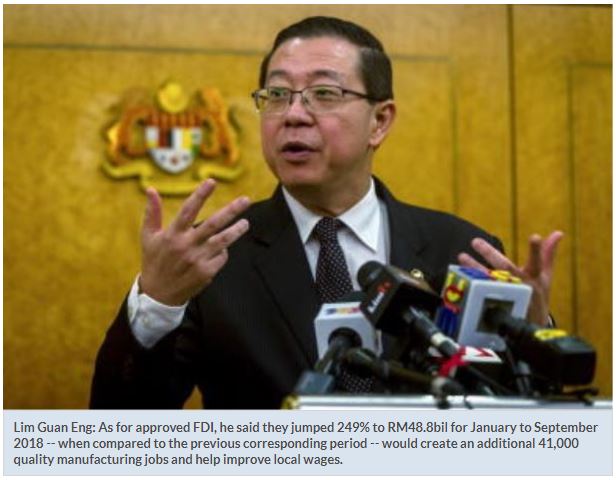Malaysia: Guan Eng upbeat on economy after January CPI data, more jobs created
KUALA LUMPUR: Finance Minister Lim Guan Eng expects the country to grow a further 4.9% this year amid a decline in inflationary pressure while an additional 41,000 quality manufacturing jobs are expected to be created in the next two years.
In a statement released on Sunday, he said the January 2019 Consumer Price Index (CPI) – which fell to the lowest in nearly 10 years — did not arise from any weakening of demand or economic growth.
“Instead, the price decline was largely caused by supply factors in the form of cheaper input cost, specifically cheaper fuel prices,” he said.
The price decline should improve the purchasing power of Malaysian consumers and add to economic growth, he added.
“Despite the 0.7% drop in the CPI, the government understands there is much to be done in bringing the living costs of ordinary Malaysians to a more manageable level, especially for those belonging to the B40 group.
“The government is working to ensure that the benefits from the reduction in CPI can be channeled downwards to a wider segment of Malaysians,” he said.
Underpinning the decline in CPI, he said was the abolishment of the Goods & Services Tax (GST) and replacing it by the Sales & Services Tax (SST) while stabilising fuel prices with a ceiling price mechanism expanded the economic pie to benefit both businesses and the rakyat.
He added the fall in prices was due to cheaper input prices. Price of RON95 petrol for instance was approximately 13% cheaper in January 2019 compared to a year ago and this has positively affected the prices of goods and services that are free from GST.
The fuel price stabilisation policy in particular passes the savings from cheaper fuel prices directly to consumers immediately while the ceiling price mechanism protects them from high and soaring petrol prices.
As for approved FDI, he said they jumped 249% to RM48.8bil for January to September 2018 — when compared to the previous corresponding period — would create an additional 41,000 quality manufacturing jobs and help improve local wages.
Lim also said the decline in prices should improve the purchasing power of Malaysian consumers and add to economic growth.
“The economy is going strong and the Government projects the 2019 GDP to expand a further 4.9% after expanding 4.7% last year. Certainty, clarity and consistency in government policy have engendered growing confidence in the business community, capital markets and investors,” he said.
He also pointed out Fitch Ratings had on Thursday reaffirmed Malaysia’s A- rating with a stable outlook based not only on the country’s healthy GDP growth, but also due to progress on fiscal reforms to increase transparency and curb corruption, fiscal consolidation to reduce the fiscal deficit, and due to Malaysia registering a positive 2018 current account balance of 2.3% to GDP.


 English
English




